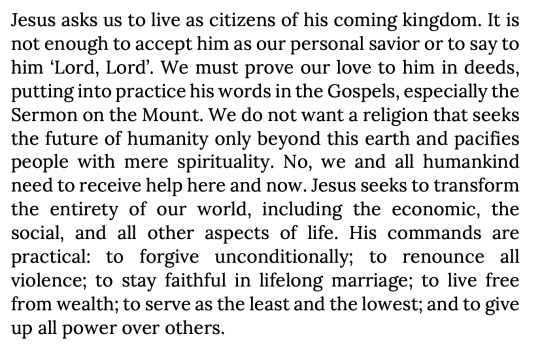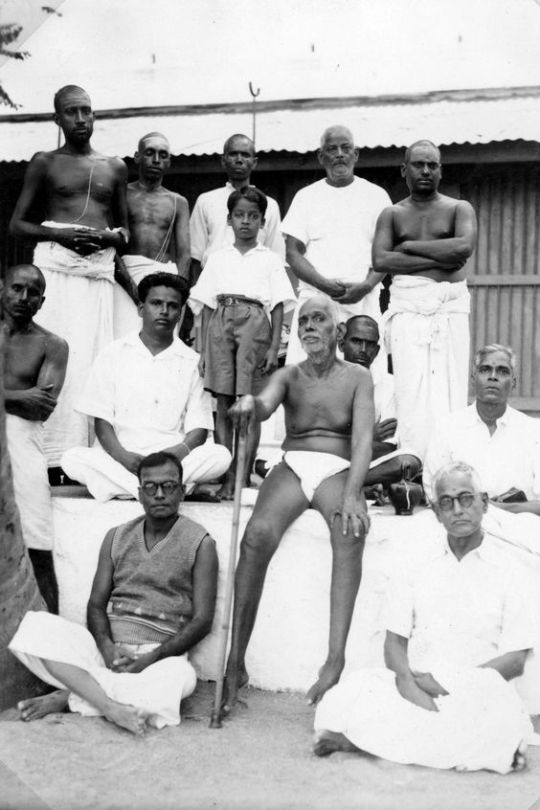#renunciation
Text

Desecrate the Holy Book, Renounce the Christian God. Deny and Blaspheme the Holy Fucking Spirit. Renounce your Christianity and Accept SATAN as your GOD and SAVOIR. HAIL SATAN!!! FUCK Jesus!!!
86 notes
·
View notes
Quote
Words can be hard to utter: those, for example, with which one renounces something, or confesses a weakness. (Words are also deeds.)
Ludwig Wittgenstein, Philosophical Investigations
#philosophy#quotes#Ludwig Wittgenstein#Philosophical Investigations#words#actions#language#renunciation#confession
188 notes
·
View notes
Photo

From Foundations of our faith and calling, the Bruderhof
#bruderhof#anabaptist#kingdom of God#christ#faith#practice#transformation#heaven on earth#forgiveness#renunciation#poverty#littleness#humility
49 notes
·
View notes
Quote
I have the gift of desiring, of inventing more and more desires, of never knowing satiation and dullness. And I am cursed with the lack of genius for renunciation.
Anais Nin
#quote#anais nin#gift#desiring#inventing#desires#knowing#satiation#dullness#cursed#lack#genius#renunciation#quotes
46 notes
·
View notes
Text
我们的业只有以对治力忏悔才能够消业,
Our karma can only be purified by repenting with antidotes.
你不针对性地忏悔,这个业是消不掉的。
If you don't specifically repent the karma, it won't disappear.
你做了恶业,你行其他的善:打比方你杀生,你来布施,你没有忏这个杀业,而只是做一些布施的话,这个善业和恶业是不能互相抵消的。
If you've committed some negative karma but do another positive action: for example, if you've committed killing, and instead of specifically repenting the karma of killing, you give alms, then it can't cancel out the negative karma of killing.
如是因、如是果,它们不互相抵消。
A cause brings a result. One cause can't cancel out another cause.
只有针对这个恶业做忏悔,用智慧来对治。
The only way is to specifically repent the negative karma and apply the antidote of wisdom.
用定和慧来对治这个业,业才能消得最快。
Only with concentration and wisdom, can the karma be eliminated most quickly.
youtube
Contact us
Whatsapp: 0086 19198395743
https://chat.whatsapp.com/HYn40sD9jsLGvo2nFlArLR
Telegram channel:https://t.me/yimonlineworkshop
Email:[email protected]
WeChat ID:sakyaYM
WeChat Official Accounts :YM PURELAND
Line: 0086 13062718859
#buddha#buddhism#dharma#TheWayOfLiberation#bodhichitta#MasterRenze#SpiritualDevelop#SpiritualEnlightment#InnerAwakening#meditation#renunciation#emptiness#WisdomOfEmptiness#peace#mindfulness#MindfulBreathing#EnergyBoost#science#philosophy#religion#samsara#LifeQuote#LifeMotivation#LifeTips#positivity#LifeAdvice#ThreeKindsOfSuffering#HowToDealWithSuffering#ScienceBuddhism#HowToControlEmotionalFeelings
3 notes
·
View notes
Text
2024 JANUARY 06 Saturday
"Now too, as then, there are souls who seek God. Unfortunately, not all of them can find him, they do not all look at the star which is faith; Nor do they dare to venture on these paths which lead to him, which are humility, renunciation, sacrifice and almost always the cross."
~ Saint Raphael Arnaiz Baron, Spiritual writings Jan. 6, 1937
#bible#gospel#further reading#saint#Raphael Arnaiz Baron#Spiritual Writings#souls seeking#God#Lord#Jesus#Jesus Christ#Christ#not all find#star of faith#venture paths#humility#renunciation#sacrifice#the cross
4 notes
·
View notes
Text
“What else can I say?
You don't know your own worth.
Do not sell yourself at a ridiculous price,
You who are so valuable in God's eyes.”
- Rumi
#self contemplation#higher consciousness#life reminders#self control#daily reflections#self awareness#rumi quotes#awakening#rumi#jalal uddin rumi#islamic reminders#life quotes#depression advice#life advice#how to live#spiritual quotes#spiritual advice#abstinence#renunciation#sufi quotes#quotes to remember#daily reminder#wisdom quotes#wise advice#god quotes#things to keep in mind#humanity quotes#social media#world quotes#social conditioning
69 notes
·
View notes
Text
Look at Jesus, he was not a humble person at all. He was not an egoist, but not humble either. That created the problem, that led him to the cross. He was not humble at all.
And now many psychologists say that he was neurotic, and they have a point. Many psychologists say that he was an egomaniac; they have a point. If psychologists study Buddha and Mahavira they will conclude the same things—but they have not studied them. They should have been studied very minutely.
So they say he was an egomaniac. Why? You can find reasons—because he was not humble. He used to say, ‘I am God,’ or ‘I am the son of God. I and my father in heaven are one.’ To the egoist mind this will appear like ego. And nobody can say that this man is humble who claims that he and God are one, or who claims that he is the son of God. It looks like a claim to us; to Jesus this was a simple fact. And he was not claiming that you are not the son of God: claiming that he is the son of God, he claimed for you all. It is Christianity which claimed the wrong thing; Christianity started to claim that he is the only son of God. That is absurd, that is egomania. But Jesus was saying a simple fact: if the whole creation is out of God, the whole creation is the son, God is the father. He was saying a simple fact with no ego in it, but this disturbed people. They thought a sage must be humble.
He used to say, ‘I am the king of the Jews.’ This has been said many times, but to people who were more wise than Jews. Jews were offended that this man who was just a beggar on the street, no more—just a vagabond, just an old hippie—that this man claimed, ‘I am the king of the Jews.’ But he was not claiming anything, he was in a state of mind where there is no ego. Kingship comes into being, but that is not ego. And that kingship doesn’t belong to any worldly affairs, it is not a claim to rule anybody. That kingship is just felt as an inner nature.
Ram Teerth, an Indian mystic of this century, used to call himself Emperor Ram. He was a beggar, but nobody took offense in India because we have known so many beggars saying that, and we know that that happens: a moment comes when a person becomes an emperor without any kingdom. Really, a person becomes an emperor only when there is no kingdom.
He went to America, and the American president invited him to visit. The American president felt uncomfortable because Ram Teerth always used to say ‘Emperor Ram.’ Even while talking he would say, ‘Emperor Ram says this.’ So the president humbly asked, ‘I cannot understand this. You don’t seem to have any kingdom, why do you claim that you are an emperor?’
Ram Teerth said, ‘That’s why I claim—because I have nothing to lose, nobody can defeat me. My kingdom is of the eternal, you cannot take it from me. Your kingdom can be taken, your presidency can be destroyed. Nobody can destroy me, I have nothing to lose. I am an emperor because I have no desires.’
If you have desires you are a beggar. So there are two types of beggars, poor beggars and rich beggars.
When Jesus said, ‘I am the king of the Jews,’ he was saying this. But people got offended. They said, ‘This is too much. This man cannot be tolerated—he must be crucified, he must be killed.’
But Jesus was a humble man, humble in this sense, that even humbleness was not there—egoless, egolessness was not there—truly humble. But then one starts saying facts. And you live in a world of ego, you interpret because of your egos. So people thought, ‘This man is claiming something—that he is the son of God, he is the king of the Jews—and he is nothing, just a beggar, a vagabond!’
In India nobody would have taken any offense. India has seen so many Jesuses, nobody would have taken offense.
In India every sannyasin is called SWAMI; swami means the master, the king. We call a man swami; swami means the lord. When he leaves everything, when he doesn’t claim anything, when he has nothing, then he becomes swami, then he becomes the lord. Jesus was claiming something Indian in a country which was not India; that became the problem.
— Osho (Vedanta: Seven Steps to Samadhi)
#osho#jesus#king#awakening#enlightenment#humility#ego#crucifixion#god#master#beggar#desire#india#renunciation#declaration#lord#claim#enlightened person#lbotca
13 notes
·
View notes
Text
youtube
RENUNCIATION-TO SEPARATE THE SOUL FROM THE FLESH
3 notes
·
View notes
Text
One who is self-controlled and unattached and who disregards all material enjoyments can obtain, by practice of renunciation, the highest perfect stage of freedom from reaction.
5 notes
·
View notes
Text
On Renunciation and Life’s Tragedies
Life is ultimately tragic. There is so much to life that will break and devour us. Amidst all of the magic and mystery, there’s functionally unlimited chaos and absurdity. The gratitude, wonder, and ease that contemplation can render really is hard won, and it’s simply not won apart from the wounds of being that befall us all, de facto.
Many of the world’s wisdom traditions, confronting this reality, have sought to distance their adherents from life’s wounds through renunciate trends- when not holding out carrots of heavenly postmortem schemas that await those who can somehow be inspired to endure.
Without a doubt renunciation (like endurance) is a well of wisdom itself, and, within that well there is significant fermentation going on, the fruits of which can minimally get you a little buzzed, and more problematically might even leave you drunk and blind.
When renunciation beckons us to simplicity, clarity, and focus it is wise. When renunciation tries to abandon humanity (individually or collectively), to prize any way of life as particularly holy, or to render sacrifice today as currency for a better tomorrow it misses the mark and is folly.
There’s no escaping the tragedy of life, there is only understanding (and thereby accepting) it, making meaning from it, and integrating it into our psychic and physical bodies in tolerable ways.
~Sunyananda

#zen#buddhism#buddha#buddhist#dharma#enlightenment#sangha#awakening#nirvana#spirituality#renunciation#religious#religion#spiritual#nondualism#nonduality#tragedy#tragic
3 notes
·
View notes
Text
“Verily, I tell you, beloved disciples, that it is better to renounce the bliss of Nirvana and to follow the path of long and bitter duty. The path of duty leads us directly to the Absolute. This is better than the bliss of Nirvana.”
— Samael Aun Weor, The Major Mysteries
#spirituality#gnosis#gnostic#gnosticism#occultism#esoteric#esotericism#samael aun weor#the Major Mysteries#nirvana#renunciation#duty#path of initiation#initiate
22 notes
·
View notes
Quote
It is very sad to abandon the only object of a life! It is very hard to tear out from one's heart and fling away from it the only love that one has cherished!
Anthony Trollope, from Can You Forgive Her?
#renunciation#life's purpose#breakup#heartbreak#give you up#abandonment#one true love#only love#painful#sad#dramatic#quotes#lit#words#excerpts#quote#literature#classics#anthony trollope#can you forgive her?
6 notes
·
View notes
Photo

Prince Siddhattha going forth in his renunciation of the worldly life
Illustration from The Life of Buddha in Pictures by the Dhammikarama Burmese Buddhist Temple in Penang
* * *
Selections from ‘The Voice of the Silence’ — part III
“The more thou dost advance, the more thy feet pitfalls will meet. The path that leadeth on, is lighted by one fire — the light of daring, burning in the heart. The more one dares, the more he shall obtain. The more he fears, the more that light shall pale — and that alone can guide. ...
The PATH is one, Disciple, yet in the end, twofold. ... At one end – bliss immediate, and at the other — bliss deferred. Both are of merit the reward: the choice is thine. ... The Open PATH leads to the changeless change — Nirvâna, the glorious state of Absoluteness, the Bliss past human thought. Thus the first Path is LIBERATION. But Path the Second is — renunciation, and therefore called the ‘Path of Woe.’ ...
Now bend thy head and listen well, O Bodhisattva — Compassion speaks and saith: ‘Can there be bliss when all that lives must suffer? Shalt thou be saved and hear the whole world cry?’ ...
Sweet are the fruits of Rest and Liberation for the sake of Self; but sweeter still the fruits of long and bitter duty. Aye, Renunciation for the sake of others, of suffering fellow men. ... The Bodhisattva who has won the battle, who holds the prize within his palm, yet says in his divine compassion: ‘For others’ sake this great reward I yield’ — accomplishes the greater Renunciation. A SAVIOUR OF THE WORLD is he. ...
Thou art enlightened — Choose thy way.”
— H.P. Blavatsky, The Voice of the Silence
#Siddhattha#Gautama Buddha#Renunciation#The Life of Buddha#Dhammikarama Burmese Buddhist Temple#Art#Beauty#Illustration#The Voice of the Silence#H.P. Blavatsky#Wisdom#The Path#Liberation#Nirvana#The Path of Woe#Bliss#Bodhisattva#Saviour
7 notes
·
View notes
Photo

When one always abides unswervingly in one’s own state (the state of Self) without knowing (any differences such as) ‘oneself’ and ‘others’, what (does it matter) if who says what about one self? Even if one praises or even if one disparages oneself, what (does it matter)? (Because in that state of Self-abidance) who is there other than oneself?
~ Reality in Forty Verses - Supplement (Ulladu Narpadu - Anubandham), V.38
This verse was composed by Sri Bhagavan for K.V. Ramachandra Aiyar.
Note :
The desire for being praised and the dislike of being disparaged, which are two sides of one coin, can be overcome perfectly only when one knows and abides as Self.
So long as the ego, the ‘I am the body’ – identification survives, one cannot but be affected in some way or other when one is praised or disparaged. See ‘Sri Ramana Sahasram’ verse 168.
But in the non-dual state of self-abidance, in which the ego or individuality has been destroyed, one does not experience any sense of otherness-that is, one does not feel any such distinction as ‘This is me, that is someone else’ – and hence if one is praised or disparaged by ‘others’ it is as if one is praised or disparaged by oneself. In other words, since the Jnani knows that He alone exist, His perfect equanimity cannot be distrurbed even in the least by either praise or disparagement.
🕉️
#Bhagavan Sri Ramana Maharshi#Ulladu Narpadu: Anubandham#UNAnubandham v.38#Reality in Forty Verses-Supplement#defects#renunciation#desire for praise#desire for fame#desire for honor#desire for relationship#desire for possession#desire for appreciation by others#likes and dislikes#praise or disparagement
10 notes
·
View notes
Text
要改变嗔恨的习气
Change the habit of anger
我们之所以嗔恨,就是从观别人过失的时候开始的,
Anger stems from finding faults in others.
不符合你的意就是过失,或者违犯了你所谓的原则,或者是伤害到了你贪爱的东西。伤害了你什么所谓的自尊、财产、朋友、妻儿,嗔心就大起了,这就是观过失。
When something goes against your will, violates your so-called principles, or harms something you cling to, such as your self-esteem, possessions, friends, or family, you get angry. This is finding faults in others.
所以,如果真要改变嗔恨的习气,就不要观任何众生一丝一毫的过失,
So, if you really want to change the habit of anger, stop finding any fault in anyone.
这是修行最重要的一个窍诀。
This is the most important tip in spiritual practice.
#buddha#buddhism#dharma#thewayofliberation#bodhichitta#MasterRenze#spiritualdevelop#spiritualenlightment#innerawakening#meditation#renunciation#emptiness#wisdomofemptiness#peace#mindfulness#mindfulbreathing#energyboost#science#philosophy#religion#samsara#threekindsofsuffering#howtodealwithsuffering#sciencebuddhism#howtocontrolemotionalfeelings#humansufferings#sufferingdukkha#buddhistwisdomforsufferingless#buddhismphilosophy#theessenceofhappiness
4 notes
·
View notes